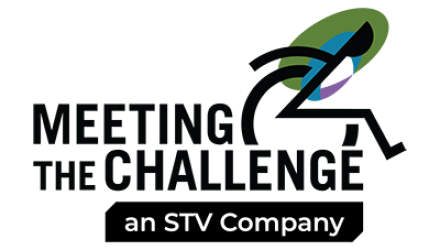MTC helps communities make their public right-of-way more accessible for people with disabilities. While the Americans with Disabilities Act was signed into law more than 25 years ago, there are still no enforceable standards for pedestrian facilities. Even without standards, cities are required to build and maintain accessible sidewalks and intersections. For public right-of-way issues, MTC consultants perform comprehensive compliance audits, using proprietary data collection and analysis software, which includes:
- Curb ramps
- Sidewalks
- Pedestrian signals and controls
- Crosswalks
- Bus stops
- Shared use paths
- Identify and prioritize accessibility compliance issues
- Create a detailed report of audited findings and recommendations
- Provide recommendations for removing pedestrian barriers
- Help develop implementation plans
- Evaluate public works policies and design assessments
Sidewalks, street crossings, and other elements in the public right-of-way can pose challenges to accessibility. The Access Board’s ADA and ABA Accessibility Guidelines focus mainly on facilities and sites. While they address certain features common to public sidewalks, such as curb ramps, further guidance is necessary to address conditions and constraints unique to public right-of-way.
The Access Board is developing new guidelines for public right-of-way which will address accessibility for blind pedestrians at street crossings, wheelchair access, and various constraints posed by space limitations, roadway design practices, slope, and terrain. The new guidelines will cover pedestrian access to sidewalks and streets, including crosswalks, curb ramps, street furnishings, pedestrian signals, parking, and other components of public right-of-way. The Access Board’s aim in developing these guidelines is to ensure that access for persons with disabilities is provided wherever a pedestrian way is newly built or altered. Once these guidelines are adopted by the Department of Justice, they will become enforceable standards under title II, of the ADA.
Evaluation
- Programs, Services, and Activities
- Program Accessibility
- Physical Access Overview
Project Methodology
- Data Collection
- Quality Control and Analysis
- Transition Plan Development
- Equivalent Facilitation
- Milestones for Barrier Removal
- Best Practice
- Calculating Priorities
- Summary of Findings
- Recommendations
- Deliverables
Case Studies
City of Louisville, CO
The City of Louisville contracted MTC to complete a study of its ADA – accessible – parking inventory in the City’s downtown business district. As on-street parking is not included in the 2010 ADA Standards for Accessible Design, MTC applied scoping and technical provisions from the U.S. Access Board’s Proposed Guidelines for Pedestrian Facilities in the Public Right-of-Way. MTC also collaborated with the HKS engineering firm for design specifications and estimated costs to implement MTC’s recommendations.
City of Fort Morgan, CO
The City of Fort Morgan engaged MTC to develop a Self-evaluation and Transition Plan based upon the accessibility survey of 15 City facilities, 9 City parks, 350 City intersections, and over 100 miles of City sidewalks. Through the analysis of collected data, MTC generated a Transition Plan Database for the facilities and parks, and another database for the public right-of-ways, identifying and prioritizing the remediation of their barriers to accessibility.
Arapahoe County, CO
MTC completed a Self-evaluation and Transition Plan for this third most populous Colorado county. Arapahoe County encompasses thirteen cities and has a population of nearly 600,000 people. The Self-evaluation determined the accessibility of this County’s programs and services. The Transition Plan addressed the accessibility survey of 27 County facilities and parks. MTC also provided a Transition Plan for the County’s pedestrian facilities, in the public right-of-way, after assessing over 1,300 intersections and more than 700 miles of walkways.
Do you need a self-evaluation and transition plan? Meeting the Challenge can help set you up for success in complying with the Americans with Disabilities Act.
